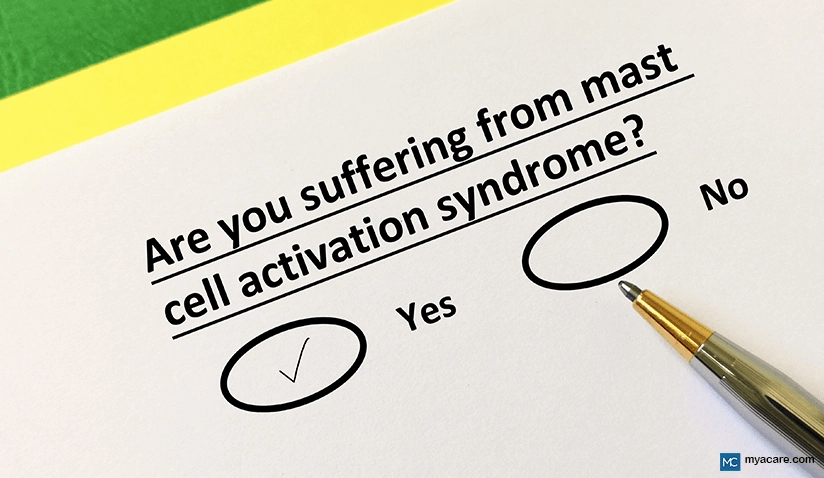Mast Cell Activation Syndrome: Types, Triggers, and Treatment

Medically Reviewed by Dr. Rosmy Barrios
Mast Cell Activation Syndrome (MCAS) is a complex and largely misunderstood condition affecting many people worldwide. This article will explore what MCAS is, its symptoms, causes, and treatment options.
What is Mast Cell Activation Syndrome?
Mast cells are white blood cells different from lymphocytes that play a crucial role in mediating allergic reactions and inflammation. They originate from bone marrow and are found in tissues like the skin, connective tissue, digestive tract, and the respiratory system[1]. Mast cells release mediators, such as histamine, prostaglandins, and cytokines, in response to various triggers, thereby causing inflammation and recruiting other immune cells. This triggering mechanism is known as degranulation.[2]
Mast Cell Activation Syndrome occurs when mast cells are overactive and release excessive amounts of chemical mediators that cause a wide range of symptoms throughout the body, including skin rashes, digestive issues, and neurological symptoms. In some cases of MCAS, activation can be life-threatening and give rise to anaphylaxis, resulting in hives (painful skin rash), severe swelling, and respiratory difficulty.
There is no known or single trigger in MCAS, which is idiopathic or primary mast cell activation. Secondary mast cell activation can occur in response to toxins, venoms, allergens, underlying illnesses, and certain medications.
Is Mast Cell Activation Syndrome an Autoimmune Disorder?
Mast Cell Activation Syndrome is not considered an autoimmune disorder, as it does not involve the immune system attacking healthy cells. However, it is often seen with other autoimmune disorders, such as lupus, rheumatoid arthritis, and multiple sclerosis.
How do Mast Cell Activation Syndrome and Mastocytosis Differ?
Mastocytosis is a rare condition marked by aberrant mast cell proliferation in different tissues, leading to tumors or lesions. These excess mast cells can accumulate in the skin, bone, or other organs, causing a range of symptoms.[3]
In contrast, MCAS does not involve an increased number of mast cells but rather an overactivation of the existing ones. This overactivation releases excessive mediators such as histamine, prostaglandins, and cytokines, resulting in symptoms throughout the body.
It is important to note that mastocytosis and MCAS can coexist in some individuals, further complicating the clinical picture.
What Causes Mast Cell Activation Syndrome?
It is still unknown what exactly causes Mast Cell Activation Syndrome. However, several theories exist about what may trigger the condition.
There are three types of MCAS that each have unique causes[4]:
- Primary MCAS is when the condition is not associated with any other underlying disease or disorder. In these cases, the cause is genetic. c-KIT mutations in clonal mast cells is the most common mutation in this type. Other genetic mutations, such as IL-4 and IL-13 gene mutations, may also contribute to excessive IgE production and filaggrin gene mutations related to atopic dermatitis risk. This type is the rarest form of MCAS.
- Secondary MCAS is when the condition is seen with another underlying disease or disorder. In these cases, the overactive mast cells may result from an IgE-dependent allergy or other reactive MCA-triggering pathology, such as autoimmune disease or cancer. Other mast cell activation disorders can lead to secondary MCAS, including mastocytosis and hereditary alpha tryptasemia (HAT).
- Idiopathic MCAS is when the cause of the condition is unknown. This is often the case for many individuals with MCAS, as the condition is still not well understood. Idiopathic MCAS is the most prevalent form.
Triggers
Some common triggers for MCAS include:
- Allergens: Pollen, dust, certain foods, and other allergens can trigger an overactive response from mast cells.
- Stress: Emotional or physical stress can cause mast cells to release excessive chemicals.
- Infections: Bacterial, viral, or parasitic infections can trigger an immune response, leading to mast cell activation.
- Medications: Antibiotics and other medications can trigger an overactive response from mast cells.
- Hormonal changes: Fluctuations in hormones, such as during menstruation or menopause, can trigger mast cell activation.
- Other: Mast cells can activate in response to several different triggers, including exercise, emotional stress, NSAIDs and anesthetics, sudden changes in temperature or extreme temperatures, unbalanced diet plans, and harsh chemicals.[5]
Many of the causes and triggers serve as risk factors for MCAS. Having a family member with the condition, severe allergies, or a lifestyle disease can elevate the risk. It is more prevalent in adults than children.[6]
What Are the Signs and Symptoms of Mast Cell Activation Syndrome?
The symptoms of MCAS can vary significantly from person to person, making it difficult to diagnose. Some common symptoms include[7]:
- Headaches or migraines
- Brain fog or difficulty concentrating
- Anxiety or panic attacks
- Depression
- Dizziness or syncope (fainting)
- Nasal congestion
- Difficulty breathing or swallowing
- Swelling of the mouth, tongue, and/or throat (anaphylaxis)
- Skin rashes, hives, itching, or flushing
- Wheezing
- Exercise intolerance
- Shortness of breath or chest pain
- Rapid heart rate or heart palpitations
- Blood pressure changes (too high or low)
- Lightheadedness
- Heartburn
- Diarrhea, nausea, or abdominal pain
- Joint pain
- Muscle pain and stiffness
- Rapid weight loss
- Fatigue
- Osteoporosis (brittle bones)
- Uterine cramps and bleeding in women
- Sexual dysfunction in men
It is crucial to speak with a healthcare provider if you are exhibiting any of the symptoms mentioned above in order to receive an accurate diagnosis. MCAS can often be misdiagnosed as other conditions, so it is important to work with a knowledgeable doctor.
How Is Mast Cell Activation Syndrome Diagnosed?
Diagnosing MCAS is an often long and complex process.
To reach a diagnosis, a patient has to meet the following criteria[8]:
- Common clinical indicators and symptoms of severe, recurring acute systemic MC activation involving a minimum of two organ systems.
- Lab-confirmed MC engagement, determined by a rise in serum total tryptase, histamine or its byproducts, or prostaglandin D2 or its urinary byproducts compared to a standard baseline.
- Positive response to medications containing MC-stabilizing agents or those acting against substances derived from MCs.
Diagnosing MCAS typically involves four main stages[9]:
- Stage 1: Identifying Signs and Patterns
- Doctors will look for evidence that at least two body systems are affected during a reaction.
- They will also look for a pattern of symptoms that come and go over time.
- The patient may need to keep a diary to track when and what may trigger symptoms.
- Stage 2: Medication Trial
- Doctors will see if the patient's symptoms improve with medications blocking mast cell mediators.
- Stage 3: Measuring Chemical Mediators
- Doctors will perform tests to measure levels of chemical mediators in the body.
- These tests may include a blood test, a urine test, or a skin prick test. Blood levels of mast cell tryptase and urine levels of Leukotriene E4 (LTE4), N-methylhistamine, and 11B -Prostaglandin F2α (11B-PGF2α)[10].
- Several novel molecular tests may assess for a KITD 816V mutation or dysfunctional CD25 markers. These are useful for detecting primary MCAS and mastocytosis.
- Alpha-tryptase gene mutations and levels may also be considered to rule out hereditary alpha tryptasemia syndrome.
- Stage 4: Ruling Out Other Conditions
- Doctors will make an effort to rule out any additional conditions that could be causing the patient's symptoms.
- This may involve additional tests such as endoscopy, colonoscopy, imaging, or bone biopsies. This can help to rule out systemic mastocytosis and other conditions that might trigger mast cells.
Mast Cell Activation Syndrome Treatment
Although there is no known cure for MCAS, there are a number of therapy options that can help control symptoms and enhance quality of life.
Treatment for Mast Cell Activation Syndrome takes an individualized approach, as everyone's triggers and symptoms are unique. The first step is ascertaining the patient's triggers (foods, medications, stress, etc.) and then devising a comprehensive treatment plan around minimizing them. Medications can help to suppress mast cell activation and lower inflammation.
The latest therapies and treatment advice include the following:
- Medication: Several medications help control MCAS symptoms:
- Mast cell stabilizers: These medications, such as cromolyn sodium, help prevent mast cells from degranulating (releasing their chemical contents) and reduce symptom severity.[11]
- Antihistamines and other medications: H1 and H2 antihistamines combat histamine's effects, reducing symptoms like itching and stomach upset.[12] Other options, like leukotriene receptor antagonists, may help specific symptoms.
- Omalizumab (Xolair): This therapy blocks free IgE and has proven to successfully treat primary mast cell activation disorders at low doses.[13]
- Dietary modifications: Identifying and avoiding food triggers can help manage MCAS symptoms. Your doctor might recommend a low-histamine, low-FODMAP, or other tailored plans. Getting advice from a nutritionist or allergy specialist to identify dietary triggers and craft a tailored diet plan that limits food-induced MCA recurrence can be helpful.
- Additional therapies: In some cases, additional treatments might be necessary, including:
- Corticosteroids: For immediate relief during severe flares.
- Leukotriene receptor antagonists: Blocking these chemicals can reduce inflammation.
- Immunomodulatory medications: Rarely, for very severe cases.
- Lifestyle changes: Managing stress, getting enough sleep, and other lifestyle modifications can be crucial in supporting overall well-being with MCAS. Speak to your doctor or consult with a specialist about what exercises you can do to aid your condition.
Latest Advancements
Research into MCAS is ongoing, and there have been several recent advancements in understanding and treating the condition.
One promising area of research is the use of monoclonal antibodies, which target specific receptors on mast cells to prevent them from releasing excessive amounts of chemicals.[14]
Tyrosine kinase inhibitors are another active area of research for treating MCAS. These are medications that can potentially block the action of KIT, a crucial factor in mast cell behavior.[15]
There is ongoing research into improving diagnostic tools and achieving higher standards of treatment personalization. With a broader understanding of mast cell activation, researchers also look at novel compounds capable of inhibiting mast cell mediator release and degranulation.
Conclusion
Mast Cell Activation Syndrome is a complex, multi-system (and frequently misunderstood) condition that can significantly affect an individual's quality of life. By gaining awareness about the symptoms, causes, and treatment options, individuals with MCAS can work with their medical care team to manage the condition and improve their overall well-being. If you suspect you may have MCAS, consult a knowledgeable healthcare professional for a proper diagnosis and treatment plan.
To search for the best doctors and healthcare providers worldwide, please use the Mya Care search engine.
The Mya Care Editorial Team comprises medical doctors and qualified professionals with a background in healthcare, dedicated to delivering trustworthy, evidence-based health content.
Our team draws on authoritative sources, including systematic reviews published in top-tier medical journals, the latest academic and professional books by renowned experts, and official guidelines from authoritative global health organizations. This rigorous process ensures every article reflects current medical standards and is regularly updated to include the latest healthcare insights.

Dr. Rosmy Barrios is an aesthetic medicine specialist with international work experience. She earned her physician diploma at the Universidad Del Norte’s School of Medicine in Barranquilla, Colombia, and her specialty at John F. Kennedy University in Buenos Aires, Argentina. Dr. Barrios is a member of the Pan-American Aesthetic Medicine Association (PASAM) and the Union Internationale de Médecine Esthétique (UIME). She is an expert health writer with keen interests in aesthetic medicine, regenerative aesthetics, anti-aging, fitness, and nutrition. Currently, Dr. Barrios heads the Regenerative Aesthetics department at a renowned Internal Medicine clinic based in Belgrade, Serbia.
Sources:
Featured Blogs



